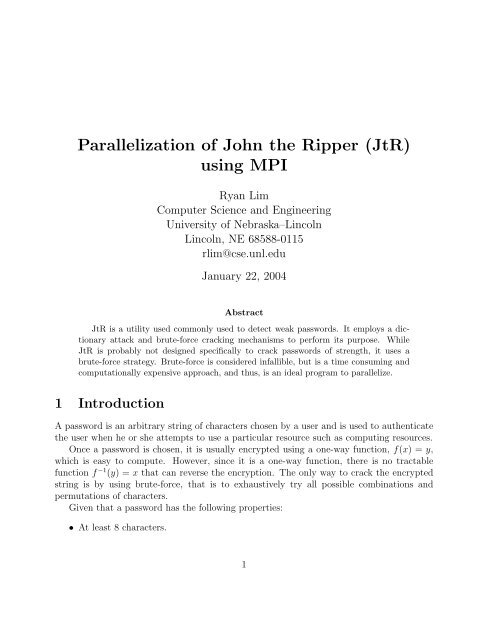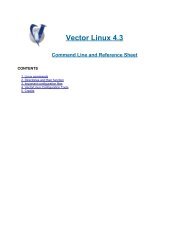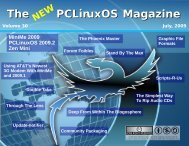Parallelization of John the Ripper (JtR) using MPI - Openwall file ...
Parallelization of John the Ripper (JtR) using MPI - Openwall file ...
Parallelization of John the Ripper (JtR) using MPI - Openwall file ...
- No tags were found...
You also want an ePaper? Increase the reach of your titles
YUMPU automatically turns print PDFs into web optimized ePapers that Google loves.
<strong>Parallelization</strong> <strong>of</strong> <strong>John</strong> <strong>the</strong> <strong>Ripper</strong> (<strong>JtR</strong>)<strong>using</strong> <strong>MPI</strong>Ryan LimComputer Science and EngineeringUniversity <strong>of</strong> Nebraska–LincolnLincoln, NE 68588-0115rlim@cse.unl.eduJanuary 22, 2004Abstract<strong>JtR</strong> is a utility used commonly used to detect weak passwords. It employs a dictionaryattack and brute-force cracking mechanisms to perform its purpose. While<strong>JtR</strong> is probably not designed specifically to crack passwords <strong>of</strong> strength, it uses abrute-force strategy. Brute-force is considered infallible, but is a time consuming andcomputationally expensive approach, and thus, is an ideal program to parallelize.1 IntroductionA password is an arbitrary string <strong>of</strong> characters chosen by a user and is used to au<strong>the</strong>nticate<strong>the</strong> user when he or she attempts to use a particular resource such as computing resources.Once a password is chosen, it is usually encrypted <strong>using</strong> a one-way function, f(x) = y,which is easy to compute. However, since it is a one-way function, <strong>the</strong>re is no tractablefunction f −1 (y) = x that can reverse <strong>the</strong> encryption. The only way to crack <strong>the</strong> encryptedstring is by <strong>using</strong> brute-force, that is to exhaustively try all possible combinations andpermutations <strong>of</strong> characters.Given that a password has <strong>the</strong> following properties:• At least 8 characters.1
• Has a good mix <strong>of</strong> upper and lowercase letters, numbers, punctuations and o<strong>the</strong>rsymbols.<strong>the</strong>re are 95 distinct choice <strong>of</strong> characters. With this assumption, a n-character password has95 n permutations (for a 8-character password, <strong>the</strong>re about 6000 trillion)!While cracking is not impossible, it would definitely take a lot <strong>of</strong> computational time.The goal <strong>of</strong> this paper is to address <strong>the</strong>se issues by parallelizing <strong>the</strong> popular password cracker,<strong>John</strong> <strong>the</strong> <strong>Ripper</strong> (<strong>JtR</strong>) [Des03] .This paper discusses related work in Section 2, my implementation in Section 3. Section 4describes how I evaluated my code and presents <strong>the</strong> results. Section 5 presents my conclusionsand describes potential future work.2 Related WorkThe San Diego Supercomputer Center (SDSC) presented its results [PK03] from applyingHigh Performance Computing (HPC) resources such as a parallel supercomputer, abundantdisk and large tape archive systems to precompute and store crypt() based passwords.SDSC’s project, Tablecrack is able to quickly determine easily guessed passwords for UNIXaccounts. Teracrack, ano<strong>the</strong>r project, applies modern HPC capabilities.A similar project, “dkbf” [B0r] is a distributed, keyboard, brute-force program for Linuxclusters <strong>using</strong> <strong>the</strong> message-passing interface (<strong>MPI</strong>). However, this program is specificallytailored to crack only Windows NT Lanman and NT hashes.<strong>JtR</strong>, on <strong>the</strong> o<strong>the</strong>r hand, supports various encryption formats such as standard and doublelengthDES, BSDI’s extended DES, FreeBSD’s MD5, OpenBSD’s Blowfish, AFS and WindowsNT Lanman formats.3 ImplementationThis section covers some <strong>of</strong> <strong>the</strong> details <strong>of</strong> <strong>the</strong> work involved in <strong>the</strong> strategy, planning andimplementation <strong>of</strong> <strong>the</strong> parallelization <strong>of</strong> <strong>the</strong> <strong>John</strong> <strong>the</strong> <strong>Ripper</strong> source code.3.1 StrategyI initially approached this problem <strong>using</strong> <strong>the</strong> bag-<strong>of</strong>-tasks approach where a single masterprocessor hands out sets <strong>of</strong> tasks (portions <strong>of</strong> keyspaces) to slave processors to conductbrute-force search. Using this approach, a master may hand out a keyspace ranging from0x000000 to 0x888888 to slave #1 and keyspace ranging from 0x888889 to 0xFFFFFF to slave2
Figure 1: Each processor p gets an equal chunk (possibles(x)/p) <strong>of</strong> <strong>the</strong> keyspace from 0 topossibles(x), where possibles(x) is <strong>the</strong> number <strong>of</strong> possible permutations for x.#2. Once slaves #1 and #2 complete <strong>the</strong>ir task, <strong>the</strong>y may return to <strong>the</strong> master processorfor more work.However, after analyzing <strong>the</strong> <strong>JtR</strong> source code, I noticed that <strong>the</strong>re would be no needfor <strong>using</strong> <strong>the</strong> bag-<strong>of</strong>-tasks approach as each processor could compute and work on separatechunks <strong>of</strong> keyspaces simultaneously (Figure 1). This is because <strong>the</strong> keyspace range is alwaysconstant, and thus, can be divided equally among all processors.3.2 PlanningIn order to find out possible code sections which can be parallelized, I pr<strong>of</strong>iled <strong>JtR</strong>’s code<strong>using</strong> <strong>the</strong> GNU pr<strong>of</strong> utility. Part <strong>of</strong> <strong>the</strong> pr<strong>of</strong>ile output can be viewed in Appendix A.Besides code pr<strong>of</strong>iling, I did some substantial analysis on <strong>the</strong> function calls listed in <strong>the</strong>gpr<strong>of</strong> output.3.3 ImplementationIn order to parallelize <strong>JtR</strong>, I chose to use <strong>the</strong> message-passing interface (<strong>MPI</strong>).The reasonfor this is because <strong>MPI</strong> is relatively portable and it is installed on many <strong>of</strong> multi-computersat <strong>the</strong> University <strong>of</strong> Nebraska - Lincoln such as rcf and prairiefire.Once code pr<strong>of</strong>iling and analysis was done, I added auxiliary functions to enable <strong>JtR</strong>to run in parallel. Most <strong>of</strong> <strong>the</strong> work was done in <strong>the</strong> <strong>file</strong> locking mechanisms, and <strong>the</strong>do incremental crack() function.In order to handle <strong>file</strong> locking, each process will ‘own’ its <strong>file</strong>s exclusively. These <strong>file</strong>sare <strong>the</strong> character set <strong>file</strong>s (all.chr, alpha.chr, digits.chr), recovery <strong>file</strong>s (john rec)and log <strong>file</strong>s (john log). Each process’ <strong>file</strong>s are denoted by <strong>the</strong> processor identifier suffix.For example, processor 0’s <strong>file</strong>s are all.chr.0, alpha.chr.0, digits.chr.0, john rec.0and john log.0Modifications to do incremental crack() enable it to splits <strong>the</strong> keyspace into chunks.Processors pick up interleaved chunks and leave <strong>the</strong> rest to <strong>the</strong> o<strong>the</strong>r processors.3
4 EvaluationSince work is evenly split between processors, <strong>the</strong> total number <strong>of</strong> crypts per second shouldincrease linearly with <strong>the</strong> number <strong>of</strong> processors. As each processor gets different sets <strong>of</strong>keyspaces, <strong>the</strong> total <strong>of</strong> crypt operations per second is approximately ∑ Pi=0 C i where C i is <strong>the</strong>crypt operations per second for processor i and P is <strong>the</strong> number <strong>of</strong> processors.Using one processor on rcf:Benchmarking: FreeBSD MD5 [32/64 X2]... DONERaw: 1124.00 c/s real, 1127.00 c/s virtualBenchmarking: OpenBSD Blowfish (x32) [32/64]... DONERaw: 74.02 c/s real, 74.01 c/s virtualUsing two processors on rcf:Benchmarking: FreeBSD MD5 [32/64 X2]... DONERaw: 2242.00 c/s real, 2248.00 c/s virtualBenchmarking: OpenBSD Blowfish (x32) [32/64]... DONERaw: 148.02 c/s real, 148.06 c/s virtualUsing eight processors on rcf:Benchmarking: FreeBSD MD5 [32/64 X2]... DONERaw: 8757.00 c/s real, 8990.00 c/s virtualBenchmarking: OpenBSD Blowfish (x32) [32/64]... DONERaw: 571.31 c/s real, 592.25 c/s virtualThis shows impressive benchmark results. One <strong>of</strong> <strong>the</strong> reasons for this is that <strong>the</strong>re israrely, if not, no communication between processors. Each processor calculates its ownkeyspace ranges and <strong>the</strong>n performs operations on it.The complete set <strong>of</strong> results are in Appendix B.5 Conclusions and Future WorkCurrently, this <strong>JtR</strong> code is only parallelized for <strong>the</strong> incremental cracking mode. This isbecause incremental cracking consumes <strong>the</strong> most time as it is searches <strong>the</strong> entire keyspace.4
This parallelized <strong>JtR</strong> does not do parallel dictionary-attacks. Adding parallel dictionaryattacksremains work to be done.In addition to that, <strong>JtR</strong> could be fur<strong>the</strong>r parallelized on shared memory architectures<strong>using</strong> OpenMP or PThreads.AcknowledgmentsA big thanks to “Solar Designer” for writing <strong>the</strong> wonderful program, <strong>John</strong> <strong>the</strong> <strong>Ripper</strong> whichis already optimized for many platforms. Ironically, I required help from a person called<strong>John</strong>, more specifically, <strong>John</strong> Lim Eng Hooi, to help me debug portions <strong>of</strong> my code. I wouldalso like to thank Dr. David Swanson for helping, advising and encouraging me thorough<strong>the</strong> semester.References[B0r]D4 B0rg. dkbf. URL source: http://dkbf.sourceforge.net/.[Des03] Solar Designer. <strong>John</strong> <strong>the</strong> ripper, 2003. URL source:http://www.openwall.com/john/.[PK03] Tom Perrine and Devin Kowatch. Teracrack: Password cracking <strong>using</strong> teraflop andpetabyte resources. 2003.5
Agpr<strong>of</strong> outputOnly functions with more than 10 calls are listed.Flat pr<strong>of</strong>ile:Each sample counts as 0.000999001 seconds.% cumulative self self totaltime seconds seconds calls ms/call ms/call name97.56 31.03 31.03 MD5_body1.18 31.40 0.37 6983883 0.00 0.00 expand0.99 31.72 0.32 176497 0.00 0.00 MD5_std_crypt0.12 31.76 0.04 261 0.15 1.59 inc_new_count0.05 31.77 0.02 170 0.10 0.10 inc_new_length0.02 31.78 0.00 88251 0.00 0.00 MD5_std_set_key0.02 31.78 0.00 88247 0.00 0.00 crk_salt_loop0.01 31.79 0.00 88247 0.00 0.00 fix_state0.01 31.79 0.00 306 0.01 1.12 inc_key_loop0.01 31.79 0.00 176498 0.00 0.00 MD5_std_set_salt0.01 31.79 0.00 176494 0.00 0.00 crk_password_loop0.01 31.80 0.00 176494 0.00 0.00 idle_yield0.01 31.80 0.00 176493 0.00 0.00 status_update_crypts0.01 31.80 0.00 749 0.00 0.00 status_get_time0.00 31.80 0.00 176493 0.00 0.00 add32to640.00 31.80 0.00 88247 0.00 0.00 crk_process_key0.00 31.80 0.00 88246 0.00 0.00 fmt_default_clear_keys0.00 31.80 0.00 745 0.00 0.00 log_time0.00 31.80 0.00 1 1.00 777.19 do_incremental_crack0.00 31.80 0.00 176501 0.00 0.00 cmp_all0.00 31.80 0.00 88251 0.00 0.00 set_key0.00 31.80 0.00 88251 0.00 0.00 strnfcpy0.00 31.80 0.00 927 0.00 0.00 mem_alloc_tiny0.00 31.80 0.00 753 0.00 0.00 get_time0.00 31.80 0.00 746 0.00 0.00 log_event0.00 31.80 0.00 745 0.00 0.00 log_<strong>file</strong>_write0.00 31.80 0.00 630 0.00 0.00 trim0.00 31.80 0.00 577 0.00 0.00 fgetl0.00 31.80 0.00 576 0.00 0.00 cfg_process_line6
0.00 31.80 0.00 463 0.00 0.00 str_alloc_copy0.00 31.80 0.00 402 0.00 0.00 cfg_add_line0.00 31.80 0.00 44 0.00 0.00 tty_getchar0.00 31.80 0.00 34 0.00 0.00 strlwr0.00 31.80 0.00 24 0.00 0.00 add32to64m0.00 31.80 0.00 24 0.00 0.00 log_<strong>file</strong>_flush0.00 31.80 0.00 21 0.00 0.00 init_line0.00 31.80 0.00 20 0.00 0.00 cfg_add_param0.00 31.80 0.00 15 0.00 0.00 mem_alloc0.00 31.80 0.00 14 0.00 0.00 cfg_add_section0.00 31.80 0.00 14 0.00 0.00 mem_free0.00 31.80 0.00 13 0.00 0.00 write_loop0.00 31.80 0.00 12 0.00 0.00 MD5_std_get_binary0.00 31.80 0.00 12 0.00 0.00 mul32by320.00 31.80 0.00 10 0.00 0.00 ldr_get_field0.00 31.80 0.00 10 0.00 0.00 path_expand7
B<strong>John</strong> <strong>the</strong> <strong>Ripper</strong> (<strong>MPI</strong>) results### 1 PROCESSOR ###rlim@rcf ~/john-1.6.36/run% mpirun -np 1 ./john -testBenchmarking: Traditional DES [64/64 BS]... DONEMany salts: 172019.00 c/s real, 172019.00 c/s virtualOnly one salt: 155584.00 c/s real, 155895.00 c/s virtualBenchmarking: BSDI DES (x725) [64/64 BS]... DONEMany salts: 5620.00 c/s real, 5632.00 c/s virtualOnly one salt: 5544.00 c/s real, 5544.00 c/s virtualBenchmarking: FreeBSD MD5 [32/64 X2]... DONERaw: 1024.00 c/s real, 1024.00 c/s virtualBenchmarking: OpenBSD Blowfish (x32) [32/64]... DONERaw: 72.02 c/s real, 72.02 c/s virtualBenchmarking: Kerberos AFS DES [48/64 4K]... DONEShort: 57344.00 c/s real, 57344.00 c/s virtualLong: 157235.00 c/s real, 157235.00 c/s virtualBenchmarking: NT LM DES [64/64 BS]... DONERaw: 1333644.00 c/s real, 1333644.00 c/s virtual### 2 PROCESSORS ###rlim@rcf ~/john-1.6.36/run% mpirun -np 2 ./john -testBenchmarking: Traditional DES [64/64 BS]... DONEMany salts: 327909.00 c/s real, 344081.00 c/s virtualOnly one salt: 308774.00 c/s real, 311576.00 c/s virtualBenchmarking: BSDI DES (x725) [64/64 BS]... DONEMany salts: 11239.00 c/s real, 11262.00 c/s virtualOnly one salt: 11110.00 c/s real, 11110.00 c/s virtualBenchmarking: FreeBSD MD5 [32/64 X2]... DONERaw: 2042.00 c/s real, 2042.00 c/s virtual8
Benchmarking: OpenBSD Blowfish (x32) [32/64]... DONERaw: 144.00 c/s real, 144.04 c/s virtualBenchmarking: Kerberos AFS DES [48/64 4K]... DONEShort: 114636.00 c/s real, 114750.00 c/s virtualLong: 314368.00 c/s real, 314682.00 c/s virtualBenchmarking: NT LM DES [64/64 BS]... DONERaw: 2666725.00 c/s real, 2664064.00 c/s virtual### 8 PROCESSORS ###rlim@rcf ~/john-1.6.36/run% mpirun -np 8 ./john -testBenchmarking: Traditional DES [64/64 BS]... DONEMany salts: 1319779.00 c/s real, 1377273.00 c/s virtualOnly one salt: 1222771.00 c/s real, 1245203.00 c/s virtualBenchmarking: BSDI DES (x725) [64/64 BS]... DONEMany salts: 44915.00 c/s real, 45084.00 c/s virtualOnly one salt: 43903.00 c/s real, 44412.00 c/s virtualBenchmarking: FreeBSD MD5 [32/64 X2]... DONERaw: 8167.00 c/s real, 8182.00 c/s virtualBenchmarking: OpenBSD Blowfish (x32) [32/64]... DONERaw: 570.12 c/s real, 576.07 c/s virtualBenchmarking: Kerberos AFS DES [48/64 4K]... DONEShort: 449816.00 c/s real, 458984.00 c/s virtualLong: 1251683.00 c/s real, 1258618.00 c/s virtualBenchmarking: NT LM DES [64/64 BS]... DONERaw: 10633686.00 c/s real, 10676429.00 c/s virtual9










